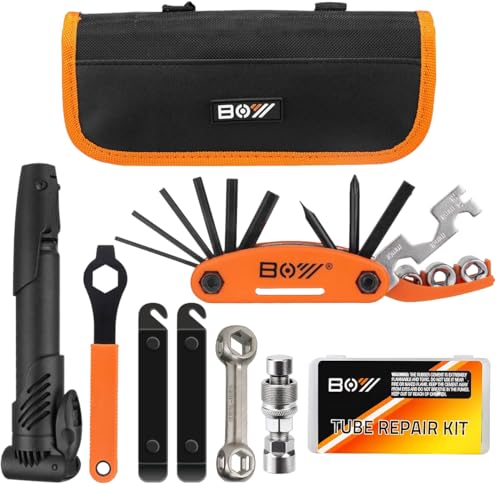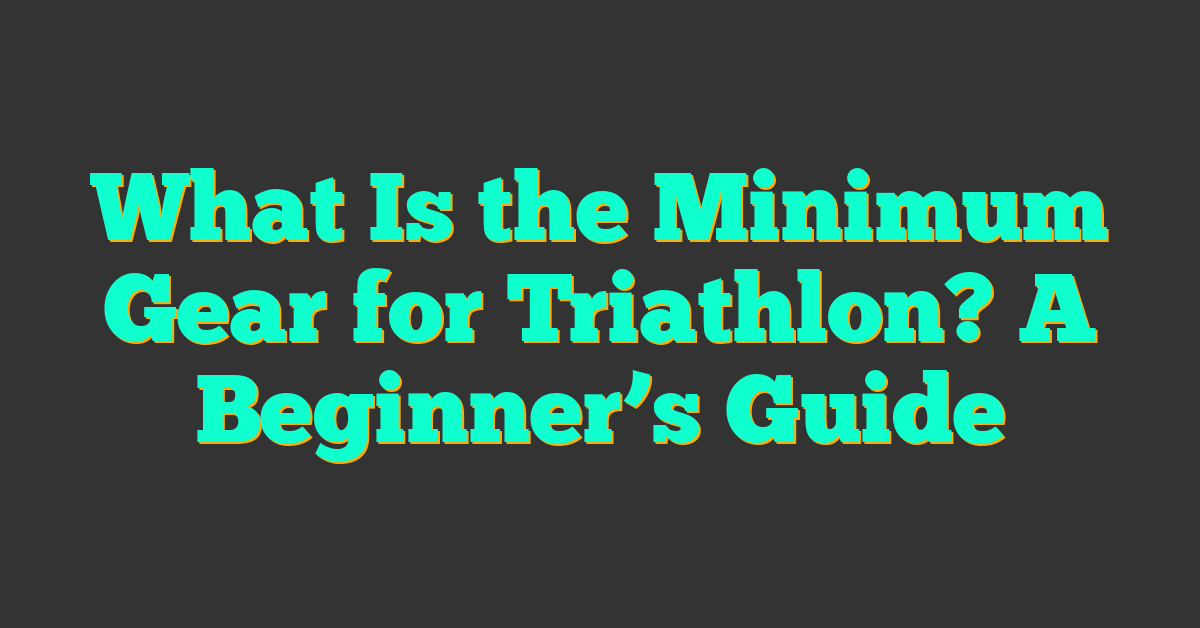Are you considering using a folding bike for your next triathlon? Folding bikes have become increasingly popular among athletes due to their portability and ease of transport. While they may seem like a convenient option, there are several factors to consider before making a final decision.

Understanding the regulations and guidelines for bikes in triathlons is crucial. According to Triathlon Budgeting, most triathlons allow any type of bike as long as it meets certain requirements, such as having two wheels and functioning brakes. However, some races may have specific rules regarding the type of bike allowed, so it’s important to check the regulations before investing in a folding bike.
Pros and Cons of Folding Bikes in Triathlons
There are several pros and cons to consider when it comes to using a folding bike in a triathlon. On the one hand, folding bikes are portable and save space, making them ideal for travel and storage. They are also lightweight and easy to carry, which can be an advantage during transitions. On the other hand, folding bikes may not be as sturdy or fast as traditional bikes, and they may not be suitable for long rides or rough terrain. Additionally, they can be more expensive than traditional bikes.
Key Takeaways
- Regulations for bikes in triathlons vary, so it’s important to check the rules before investing in a folding bike.
- Folding bikes offer portability and space-saving benefits but may not be as sturdy or fast as traditional bikes.
- Consider your needs and preferences when selecting a folding bike for triathlons.
Understanding Triathlons and Bike Regulations
https://www.youtube.com/watch?v=LrALm6_rAZo&embed=true

Triathlon Race Overview
A triathlon is a multi-sport event that involves three consecutive endurance races: swimming, cycling, and running. The order of the race is always the same, starting with swimming, followed by cycling, and concluding with running. Triathlons can vary in distance, but the most common distances are sprint, Olympic, half-Ironman, and Ironman.
UCI and Triathlon Bike Rules
The International Cycling Union (UCI) is responsible for setting the rules and regulations for cycling events, including triathlons. UCI rules dictate the design and specifications of the bikes used in triathlons. However, triathlon events have their own specific rules that must be followed.
In general, triathlon bikes must adhere to the following rules:
- Bikes must have a free-wheeling mechanism.
- Bikes must not be longer or wider than a standard bike.
- Bikes must not have any means to propel itself.
- Electrical bikes are prohibited.
It is important to note that triathlon rules are subject to change, and it is recommended to check with the race organizer for any updates or changes. Additionally, the use of folding bikes in triathlons is a topic of debate, and some events may allow them while others may not.
When participating in a triathlon, it is important to adhere to the rules and regulations to ensure a safe and fair competition. Violating the rules can result in penalties or disqualification.
Pros and Cons of Folding Bikes in Triathlons
https://www.youtube.com/watch?v=KffrXpl0gPc&embed=true
If you are considering using a folding bike in a triathlon, it’s important to weigh the pros and cons before making a decision. Here are some advantages and challenges to consider:
Advantages of Using Folding Bikes
Convenience and Portability: One of the biggest advantages of a folding bike is its portability. You can easily transport it to the race or store it in your apartment or car. It also saves space and allows you to store other things.
Traveling made easy: As a traveling triathlete, you can carry your folding bike as a piece of luggage when moving from one place to another.
Cost-effective: Folding bikes are generally less expensive than traditional bikes, and they can save you money on storage and transportation costs.
Versatility: Folding bikes can be used for both training and racing, making them a versatile option for triathletes.
Challenges and Limitations
Performance: Folding bikes may not perform as well as traditional bikes due to their smaller wheels and frame. This can affect your speed and aerodynamics during the race.
Comfort: Folding bikes may not be as comfortable as traditional bikes, especially during longer rides. The smaller frame and wheels can make the ride feel bumpier and less stable.
Weight: Folding bikes tend to be heavier than traditional bikes due to their additional hinges and folding mechanisms. This can make them more difficult to carry and transport.
Limited Options: Not all triathlon races allow folding bikes, so it’s important to check the rules and regulations before deciding to use one.
Overall, folding bikes can be a convenient and cost-effective option for triathletes. However, they may not perform as well or be as comfortable as traditional bikes, and their use may be limited in some races. It’s important to weigh the pros and cons and consider your individual needs and preferences before making a decision.
Comparing Bikes: Folding vs Traditional
https://www.youtube.com/watch?v=CDkjaBpbPkk&embed=true
When it comes to triathlons, choosing the right bike is crucial. While traditional road bikes are the most popular choice, folding bikes are becoming increasingly popular due to their portability and convenience. In this section, we will compare folding bikes to traditional bikes and explore the pros and cons of each option.
Road Bikes and Triathlon Bikes
Road bikes and triathlon bikes are the most popular choices for triathletes. They are designed for speed and efficiency, with lightweight frames and aerodynamic designs. Traditional road bikes have a fixed frame, while triathlon bikes have a more aggressive geometry that allows for a more aerodynamic riding position.
Folding bikes, on the other hand, are not typically designed for speed and efficiency. They have smaller wheels and a heavier frame, which can make them slower and less efficient than traditional road bikes. However, folding bikes are much more portable than traditional bikes, making them a great option for triathletes who need to transport their bike to and from events.
Mountain and Hybrid Bikes
Mountain and hybrid bikes are not typically used in triathlons, but they are still worth considering if you are looking for a more versatile option. Mountain bikes are designed for off-road use, with wider tires and a more durable frame. Hybrid bikes are a cross between road bikes and mountain bikes, with a lightweight frame and wider tires that can handle both on-road and off-road terrain.
While mountain and hybrid bikes are not as fast or efficient as traditional road bikes, they are more versatile and can handle a wider range of terrain. Folding mountain and hybrid bikes are also available, making them a great option for triathletes who want a more versatile bike that can be easily transported.
In summary, traditional road bikes are the most popular choice for triathletes due to their speed and efficiency. However, folding bikes are becoming increasingly popular due to their portability and convenience. Mountain and hybrid bikes are also worth considering if you are looking for a more versatile option. Ultimately, the choice between a folding bike and a traditional bike will depend on your individual needs and preferences.
Practical Aspects of Folding Bikes for Athletes
https://www.youtube.com/watch?v=ClkquBmI-ZU&embed=true
When it comes to triathlons, the practical aspects of a folding bike are worth considering. Here are some key factors to keep in mind when deciding whether a folding bike is right for you:
Travel and Transportation
One of the biggest advantages of a folding bike is its portability. If you’re a traveling athlete, a folding bike can make your life easier. You can easily pack it up and take it with you on a plane or other public transport. Some models even come with built-in carrying cases, making them even more convenient.
Storage Solutions and Security
« Can You Use a Snorkel in a Triathlon? A Quick Guide to the Rules and Regulations
Can You Walk in a Triathlon? Tips for Beginners »
Another benefit of a folding bike is its compact size. When you’re not using it, you can easily store it in a closet or under a desk. This makes it a great option for athletes who don’t have a lot of storage space. Additionally, a folding bike is less likely to be stolen than a traditional bike. Since it can be easily stored indoors, it’s less visible to potential thieves.
To ensure your folding bike is secure, consider investing in a high-quality lock. While folding bikes are generally less expensive than traditional bikes, they can still be a significant investment. Protect your investment by choosing a lock that is both sturdy and easy to use.
Overall, a folding bike can be a practical and convenient option for athletes. Whether you’re traveling to a race or simply looking for a more compact storage solution, a folding bike may be the right choice for you.
Selecting the Right Folding Bike for Triathlons
https://www.youtube.com/watch?v=pC4rWWlCdIc&embed=true
If you’re considering using a folding bike for triathlons, there are a few key features to consider before making your purchase. In this section, we’ll discuss the most important factors to keep in mind when selecting the right folding bike for triathlons.
Key Features to Consider
Quality and Cost
When it comes to folding bikes, you generally get what you pay for. While you can find some affordable options, keep in mind that they may not be as durable or have as many features as more expensive models. That being said, you don’t necessarily need to break the bank to get a quality folding bike for triathlons. Look for a bike with a sturdy frame and components that can handle the demands of training and racing.
Components
The components of a folding bike can have a big impact on your overall experience. Look for a bike with high-quality components, such as Shimano gears and brakes, for smooth and reliable shifting and stopping. You’ll also want to consider the wheel size, as larger wheels can provide a smoother ride and better handling.
Folding Mechanism
Of course, the folding mechanism is a crucial feature of any folding bike. Look for a bike with a simple and easy-to-use folding mechanism that allows you to quickly and easily fold and unfold the bike. The Schwinn Loop, for example, has a simple one-step folding mechanism that makes it easy to store and transport.
Top Folding Bike Recommendations
Schwinn Loop
The Schwinn Loop is a popular folding bike that is well-suited for triathlons. It has a sturdy frame, 7-speed Shimano gears, and 20-inch wheels for a smooth ride. The bike also features a comfortable saddle and adjustable handlebars for a customized fit. Plus, it has a one-step folding mechanism that makes it easy to store and transport.
Dahon Speed Uno
The Dahon Speed Uno is another great option for triathletes. It has a lightweight frame, single-speed drivetrain, and 20-inch wheels for a fast and agile ride. The bike also features a comfortable saddle and folding pedals for easy storage. While it may not have as many gears as some other models, the simplicity of the single-speed drivetrain can be an advantage for triathletes who want to focus on their training without worrying about shifting gears.
Brompton S6L
The Brompton S6L is a high-end folding bike that is well-suited for serious triathletes. It has a lightweight frame, 6-speed Shimano gears, and 16-inch wheels for a fast and nimble ride. The bike also features a comfortable saddle and adjustable handlebars for a customized fit. While it may be more expensive than other models, the Brompton S6L is known for its high-quality components and excellent resale value.
When selecting the right folding bike for triathlons, keep in mind the key features discussed above and consider one of the top folding bike recommendations mentioned. With the right bike, you can enjoy the benefits of a folding bike while still performing your best in triathlons.
Frequently Asked Questions
https://www.youtube.com/watch?v=boZW-OwC5fY&embed=true
What advantages do folding bikes offer for triathlon participants?
Folding bikes are becoming increasingly popular among triathlon participants due to their portability and ease of transport. Their ability to be folded into smaller sizes makes it easy to create space for the storage of other things, making them ideal for commuters and travelers. Additionally, folding bikes are often lightweight and easy to maneuver, which can be a significant advantage in triathlons where speed and agility are essential.
Are there any limitations to using a folding bike in a triathlon event?
While folding bikes offer several advantages, they also have some limitations that you should consider before using them in a triathlon. For instance, folding bikes typically have smaller wheels than traditional triathlon bikes, which can affect their overall speed and stability. Additionally, folding bikes may not be as aerodynamic as traditional triathlon bikes, which can impact your performance in longer races.
How do folding bikes compare to traditional triathlon bikes in terms of performance?
Folding bikes are generally not as fast as traditional triathlon bikes due to their smaller wheels and less aerodynamic design. However, they can still be an excellent option for shorter races or for those who prioritize portability and convenience over speed. If you are serious about competing in triathlons, you may want to consider investing in a traditional triathlon bike for optimal performance.
What should I consider when choosing a bike for my first triathlon?
When choosing a bike for your first triathlon, you should consider several factors, including your budget, your level of experience, the length of the race, and your personal preferences. If you are on a tight budget, a folding bike may be a more affordable option, but it may not provide the same level of performance as a traditional triathlon bike. Additionally, if you are new to triathlons, you may want to consider a more beginner-friendly bike that is easier to handle and maneuver.
Can modifications enhance a folding bike’s suitability for triathlons?
Yes, modifications can help enhance a folding bike’s suitability for triathlons. For instance, you can upgrade the wheels to larger, more aerodynamic models, or add aerodynamic handlebars to improve your speed and stability. Additionally, you can adjust the seat and handlebars to ensure a comfortable and efficient riding position.
Is the riding experience different on a folding bike compared to a standard road bike during a triathlon?
Yes, the riding experience on a folding bike can be different from a standard road bike, especially in terms of stability and speed. Folding bikes typically have smaller wheels and a less aerodynamic design, which can make them less stable and slower than traditional road bikes. However, with proper modifications and adjustments, a folding bike can still be a viable option for triathlon participants.










